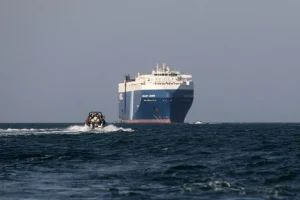I must say, it was an unfortunate event in the history of shipping sector.
In the realm of global shipping, recent developments at two critical choke points – the Red Sea and the Panama Canal – have sent ripples through the world of logistics. Here, we unpack the intricacies of these challenges and their potential ramifications on over a third of global trade.
Red Sea Attacks: Unraveling the Complex Web
Recent drone attacks on ships in the Red Sea by Yemen-based Houthi rebels have stirred concerns in the maritime community. As a vital trade route for the global movement of goods, any disruption in the Red Sea has far-reaching implications. The attacks, driven by geopolitical tensions, raise questions about the safety and security of vital shipping lanes.
Connecting the Dots: Panama Canal Drought
Simultaneously, the Panama Canal faces a unique challenge – a drought leading to a drop of over 50% in shipping activity. The 51-mile stretch, connecting the Atlantic and Pacific Oceans, has been hit by drought conditions, compelling ships from Asia to the US to seek alternative routes, particularly the Suez Canal.
Global Trade at Stake: Understanding the Impact
The significance of these events cannot be overstated. Over 80% of global goods trade relies on sea routes, and disruptions at these key points force shipping lines to take longer, alternate routes, inevitably driving up freight rates. For developing countries like India, heavily dependent on sea trade, this poses a significant economic concern.
The Panama Predicament: A Drought-Induced Slowdown
The Panama Canal, usually a bustling conduit for shipping, is experiencing a slowdown due to drought, pushing vessels towards the Suez Canal. LNG vessels, vital for energy transport, are participating in costly auctions to expedite transit, adding financial strain to an already complex situation.
Resilience of Oil Flows to India: A Silver Lining
While global oil and petroleum flows have declined by over 50% due to the Red Sea attacks, India’s oil imports have remained largely unaffected. Russia’s role as a key ally, allowing its tankers to pass through, underscores the strategic resilience of India’s oil supply chain amidst geopolitical unrest.
As global shipping firms impose war risk surcharges in response to the Red Sea attacks, freight rates for Indian shipments could surge by 25-30%. This poses challenges for exporters, especially in labor-intensive sectors, impacting India’s economic ties with the European Union.
Shipping giant Maersk’s preparations to resume operations in the Red Sea indicate a proactive response to security concerns. However, the fluidity of the situation underscores the need for vigilance and adaptability in the ever-evolving world of global trade.
